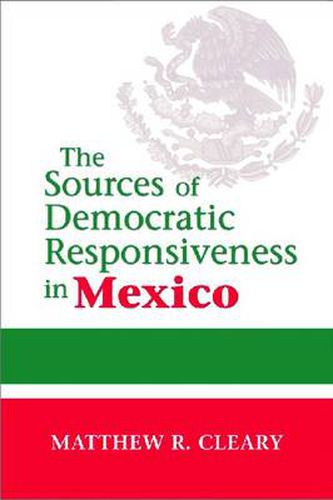Readings Newsletter
Become a Readings Member to make your shopping experience even easier.
Sign in or sign up for free!
You’re not far away from qualifying for FREE standard shipping within Australia
You’ve qualified for FREE standard shipping within Australia
The cart is loading…






Matthew Cleary investigates the political sources of improved government responsiveness in contemporary Mexico. He draws on existing theoretical frameworks that explain responsiveness (the degree to which government output matches public preferences) as a function of electoral accountability mechanisms, direct participatory pressure, or a combination of the two. Cleary demonstrates that electoral competition is not the cause of improved responsiveness among Mexican municipal governments. Instead, he attributes responsiveness in the 1980s and 1990s to a prior qualitative shift in participatory politics that began in the 1970s and continues to this day. The inability of electoral competition to improve responsiveness is, Cleary argues, a function of Mexico’s political institutions. The book demonstrates the implications of thinking broadly about the variety of strategies that citizens use, on a daily basis, to influence the behavior of politicians.
The Sources of Democratic Responsiveness in Mexico exposes serious flaws in conventional understandings of electoral competition in Mexico. Cleary’s careful critique of electoral accountability theory and his theory of participatory responsiveness address broader theoretical and conceptual issues that extend beyond the Mexican situation. The book will interest students and scholars of comparative democracy, Mexican politics, and Latin American politics.
$9.00 standard shipping within Australia
FREE standard shipping within Australia for orders over $100.00
Express & International shipping calculated at checkout
Matthew Cleary investigates the political sources of improved government responsiveness in contemporary Mexico. He draws on existing theoretical frameworks that explain responsiveness (the degree to which government output matches public preferences) as a function of electoral accountability mechanisms, direct participatory pressure, or a combination of the two. Cleary demonstrates that electoral competition is not the cause of improved responsiveness among Mexican municipal governments. Instead, he attributes responsiveness in the 1980s and 1990s to a prior qualitative shift in participatory politics that began in the 1970s and continues to this day. The inability of electoral competition to improve responsiveness is, Cleary argues, a function of Mexico’s political institutions. The book demonstrates the implications of thinking broadly about the variety of strategies that citizens use, on a daily basis, to influence the behavior of politicians.
The Sources of Democratic Responsiveness in Mexico exposes serious flaws in conventional understandings of electoral competition in Mexico. Cleary’s careful critique of electoral accountability theory and his theory of participatory responsiveness address broader theoretical and conceptual issues that extend beyond the Mexican situation. The book will interest students and scholars of comparative democracy, Mexican politics, and Latin American politics.